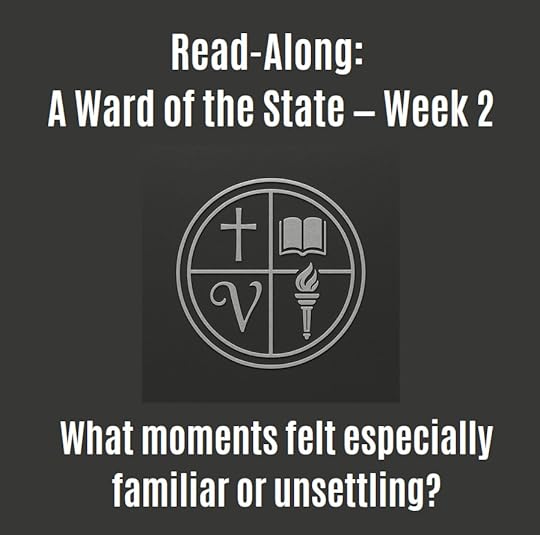M.E. Wright's Blog, page 2
July 14, 2025
Read-Along Week 2 - Belonging Is Conditional
The rules aren’t written down—but Allison is learning them fast.
In Chapters 6–10, Allison is pulled deeper into the world of The Firm, a family that looks unified but runs on silent exclusions. Her mother is powerful but unrecognized. Her aunt is competent but discarded. And Allison herself? She’s beginning to suspect she only matters when she plays the part.

This week’s chapters explore what it means to almost belong—at school, in family, in faith.
Everyone says the right things. But the expectations underneath are rigid, unforgiving, and full of holes.
She’s told to trust the system. She’s told the truth doesn’t matter if it’s inconvenient. She’s told her value is in being quiet, obedient, polished. And yet, she doesn’t stop asking questions.
She searches for proof in photo albums. She challenges the school’s fake curriculum. She pushes back, politely, against Tomas and his carefully worded threats. And, she notices what people won’t say, and why.
In these chapters, we see how identity can be erased without force. Not through punishment, but through silence, side comments, polite omissions. Belonging becomes a reward.
When have you felt like you had to earn your place in a group? What moments in these chapters felt especially familiar or unsettling?
📖 You can still join the read-along!
Grab A Ward of the State for just $2.99, available directly from the author:
https://www.mewright.com/store/p/a-ward-of-the-state-the-unborn-child-protection-act-book-3
July 7, 2025
Read-Along Week 1: Compliance Isn’t Consent”
Allison is back in Manhattan. Her room is redecorated. Her wardrobe is upgraded. Her school schedule is planned. But something is wrong.
In Chapters 1–5 of A Ward of the State, we watch Allison get shuffled from one polished performance to the next—boutique shopping, school meetings, classroom placement—all under the watchful eye of a system that claims to have her best interests at heart.
Her voice is sharp. Her mind is clear. And yet, no one is listening.
That’s the point. She’s not meant to be heard, only managed.
These chapters are about the tension between going along with something and truly agreeing to it. Compliance is expected. Obedience is rewarded. But inside, Allison is already rebelling.
She’s reading between the lines of her assignments.
She’s questioning what Vanguard is teaching—and why.
She’s watching her mother shift from woman to weapon in a heartbeat.
She’s seeing it all.
And we, as readers, are being asked to see it too.

Let’s talk: Where do you see control disguised as care in these chapters? Which scene hit hardest for you?
July 6, 2025
Headlines From a Dystopia That Look Familiar

LOCAL MOTHER FACES CHARGES AFTER MISCARRIAGE RULED “PREVENTABLE”
Negligence reframes tragedy when grief is treated like guilt.
This one came from a line in my notes: “They don’t need to prove intent, just the failure to comply.” In the world of the novel, missing a state-mandated prenatal check-in can be grounds for investigation. The medical system doesn't act as a shield. It becomes a sieve for blame.
TEEN DENIED SCHOOL REENTRY AFTER “STATE CUSTODY” BIRTH
Supervised birth brings lifetime stigma. Surveillance doesn’t end at delivery.
The social aftermath of being court-monitored while pregnant is rarely discussed. But in this draft headline, a teen is denied reentry to her school. Not for disciplinary reasons, but for “disruption.” Her presence is politicized. Her silence becomes rebellion.
COURT ALLOWS GPS ACCESS TO FAMILY COURT IN LANDMARK RULING
Real-time tracking redefined as “protecting the child.”
This one feels clinical. That’s what makes it terrifying. The legal justification sounds reasonable until you realize it normalizes constant location access for any minor flagged by the system. The Family Court’s role shifts from adjudication to surveillance.
And in The Unborn Child Protection Act series, it already happened.
July 4, 2025
We’re Reading This Together. Join the Read-Along for A Ward of the State

Starting Monday, we’re reading A Ward of the State together—chapter by chapter, theme by theme. You’ll get new posts each week with discussion prompts, hidden lore, quotes, and a space to unpack everything you’re feeling.
Whether you’ve read it already or you’re starting now, this is your invitation to join us.
Here’s how it works:📚 Mondays: Read-Along posts (spoiler-safe reflections + prompts)
✂️ Midweek Notes: Behind-the-scenes cuts and real-world parallels
❓ Sundays: Bonus lore and thought polls
🔒 Fridays: Optional deeper dives for paid subscribers
Week 1 begins Monday, July 8. We’re starting with Chapters 1–5.
Got questions? Drop them below. Got theories? You’ll want to save those.
June 27, 2025
The Legal Status of a Fetal Heartbeat
The phrase “ward of the state” used to describe a child who had no one left to care for them. It was a legal term reserved for orphans, children abandoned by their parents, or those removed from unsafe homes. It was rare, serious, and usually temporary.
Not anymore.
June 16, 2025
Real Laws That Inspired A Ward of the State
In A Ward of the State, that question isn’t science fiction. It’s the legal starting point. And many of the policies that shape Allison Maxwell’s world are grounded in real, existing laws.
This post isn’t about speculation. It’s about precedent.
Wisconsin’s Act 292, passed in 1997, allows the state to detain pregnant women accused of using alcohol or drugs if it believes the fetus is endangered. These women can be placed in state custody even if they haven’t been charged with a crime.

In the world of A Ward of the State, I imagined what would happen if laws like this were expanded. What if fetal personhood wasn’t just a theory, but a full legal designation? What if the fetus became a ward of the state before birth? And what if that designation didn’t end at birth, but extended into childhood?
Several U.S. states have passed or attempted to pass personhood laws, granting legal rights to fetuses at conception. In practice, these laws create legal conflicts around abortion, miscarriage, IVF, and even routine prenatal care.
In my novel, those tensions play out on a national scale. When the law treats embryos as citizens, what happens to the rights of the person carrying them?
The most effective systems of control don’t announce themselves. They look like care. Until you try to say no.
One case that is haunting me is Adriana Smith’s. She was a 30-year-old nurse in Georgia, declared brain dead in early 2025. The state has refused to remove life support because she was pregnant. Georgia law prohibits withdrawing care in these cases as long as there is a fetal heartbeat, even when the mother is legally dead.
Her mother called it 'torture,' watching her daughter’s body kept functioning against her will. Her legal personhood ended. Fetal personhood overruled it.
The real laws that inspired this story aren’t hidden in dusty archives. They’re on the books right now. They’re expanding in state legislatures. They’re being tested in courts.
The Unborn Child Protection Act series isn’t a warning about what could happen. It’s a reflection of what’s already begun.
If that makes you uncomfortable, good. It should.
The Unborn Child Protection Act Companion Site is a reader-supported publication. To receive new posts and support my work, consider becoming a free or paid subscriber.
June 11, 2025
Kate and Lena’s Handshake
Before it was jewelry. Before it was protocol. Before it became a quiet rebellion, it was just a handshake.

June 6, 2025
Frequently Asked Questions
Q: What is The Unborn Child Protection Act series about?
A: It’s a near-future dystopian series set in a version of America where fetal rights override individual freedom. The story begins with forced parenthood and expands into generational consequences. It follows Sam, Rylee, and their daughter Allison as they navigate a system designed to control their lives from conception through adulthood.
Q: Was this always meant to be a series?
A: No. The Fatherhood Mandate was supposed to stand alone. But readers wanted to know Rylee’s side. Then came the bigger question—what kind of life would a child have if the state mandated her existence? That’s when The Motherhood Mandate and A Ward of the State took shape. The series grew because the questions kept coming.
Q: What order should I read the books in?
A: For the full arc, read them in this order:
Thin Blue Lines (prequel)
The Motherhood Mandate
The Fatherhood Mandate
A Ward of the State
 BOOK FORMATS & WHERE TO BUY
BOOK FORMATS & WHERE TO BUYQ: Where can I get the books?
A: All books are available in ebook, paperback, and audiobook formats. For the best prices, visit mewright.com/store. You’ll also find them on Amazon, Apple, Audible, Google Play, Kobo, Barnes & Noble, and some library systems like Hoopla.
Q: Do you offer signed copies?
A: Yes. Signed paperbacks are available through the official store. You can request a personalized note at checkout.
Q: I live outside the U.S. Can I still get your books?
A: Yes. Ebook and audiobook formats are available globally. For signed copies, we are restricted to the U.S. only.
Q: Is this world based on real laws?
A: Yes. The fiction is built on real precedents, especially Wisconsin’s 1997 Act 292 and related surveillance laws. Every element has a counterpart somewhere in existing legal systems. The world evolves from there.
Q: How is Project 2025 connected to the series?
A: Project 2025 is a real policy agenda that mirrors many of the themes in the books: control over reproductive rights, forced traditional roles, and surveillance in the name of stability. The series isn’t a reaction to it, but the overlap is unsettling.
Q: Where is the story set?
A: Key locations include Manhattan, Chicago, and the Milwaukee area. Each setting was chosen to reflect the cultural and legal pressures shaping the characters’ lives.
Q: Is this a warning or a prediction?
A: It’s a warning. These stories ask what might happen if we let fear and control define the law. It’s not meant to predict the future, but to challenge the present.
Q: Are the characters based on real people?
A: No. But their struggles are real. The dilemmas they face reflect what happens when policy replaces choice.
Q: How are the characters connected?
A: Sam and Rylee were forced into parenthood under Wisconsin’s Unborn Child Protection Act. Allison is their daughter. Her story, in A Ward of the State, explores what it means to grow up under those laws.
Q: Can I learn more about the characters?
A: Yes. “Then & Now” profiles and bonus scenes are available on Substack and through the author’s newsletter.
Q: Can we download a printable version of the discussion guide?
A: Yes. Discussion kits will be available in PDF format. You can sign up at m-e-wright-author.kit.com/bookclub. You’ll find questions, character notes, and bonus materials to print or share with your group. These are ideal for both clubs and classrooms.
Q: Is there a character map or something to help us track the relationships?
A: A character relationship guide is in development. In the meantime, the book club kit includes a “Who’s Who” section with character roles and how they connect across the series.
Q: Is there a suggested reading schedule?
A: Yes. You'll find a 4-week and 6-week pacing guide inside the club kit. Each includes reading breaks, discussion checkpoints, and questions that build week by week.
Q: Can these books tie into classroom subjects like civics or government?
A: Yes. While the series is fiction, it explores real-world systems of power and how they shape family, autonomy, and identity. Teachers have used these books to spark discussions on surveillance, reproductive control, gender policy, and civic responsibility. Educators are welcome to adapt the materials for classroom use.
Q: Are these books appropriate for teens?
A: The series is intended for adult and mature teen readers. It deals with coercion, state control, and emotional trauma, but without graphic violence or explicit sexual content. These books focus on emotional complexity and psychological realism, making them well-suited for high school juniors and seniors with guided discussion.
Q: Are there any behind-the-scenes notes or author reflections we can share?
A: Yes. M.E. shares deleted scenes, writing process notes, and reflections on the series. Some of these are included in the book club materials, and others can be accessed through mewright.substack.com if your group wants a deeper dive.
Q: Can M.E. Wright join our group for a Q&A?
A: Absolutely. Virtual visits are available for book clubs and educator groups. If you're in Southeastern Wisconsin, in-person visits may be possible too.Q:
Q: What kinds of questions can we ask M.E. Wright during a live Q&A?
A: Anything from craft to character to worldbuilding. Some groups like to ask about the inspiration behind the story or which scenes changed the most during editing. Others dig into the legal framework, ethical themes, or character decisions. If you're not sure where to start, we can provide a short list of suggested questions to get the conversation flowing.
Q: What inspired you to write this series?
A: Readers kept asking what happened to Sam, Rylee, and Allison. The laws in The Fatherhood Mandate were meant to tell one story, but the consequences didn’t end there. The series became a way to explore what happens when the system keeps demanding more from people who never had a choice in the first place.
Q: What’s next after A Ward of the State?
A: M.E. isn’t quite done with this universe. Several short stories are in the works, each expanding the world from different angles. One may grow into a novella or even a full novel, depending on where the characters take it.
In addition, a new duology called A Path Not Taken is in progress. These books will explore trauma, emotional survival, and quiet forms of rebellion. Set in the same world, they introduce new characters and fresh challenges while staying rooted in the same high-stakes systems of control.
COMMUNITY & EXTRASQ: Are there extras for fans of the series?
A: Yes. Deleted scenes, character lore, and behind-the-scenes notes are shared on Substack. There are also giveaways, trivia nights, and reader polls. Newsletter subscribers get early access to everything.
Q: How can I get involved?
A: Join the conversation on the Unborn Child Protection Act Companion Site, follow M.E. on Instagram or Facebook, or join the Writer’s Garden Discord.
Q: Is there official merch for the series?
A: Yes. You’ll find mugs, metal bookmarks, tote bags, notebooks, and apparel inspired by The Unborn Child Protection Act series. Favorites include the Stronger Together Tote Bag, Princesses Can Slay Their Own Damn Dragons Spiral Notebook, and Women Supporting Women buttons. All designs reflect themes of resistance, survival, and strength.
Explore accessories and clothing at mewright.com/store.
June 2, 2025
We have a winner!
We have a winner!

Congratulations to Ria M. for winning the A Ward of the State Prize Pack: a signed paperback, a custom wristband, and a collector’s button.
This is part of the June launch celebration for A Ward of the State, a novel set in a future where freedom is conditional and the truth is tightly controlled.
Thank you to everyone who entered. If you didn’t win this time, stay tuned. More giveaways and rebel merch are coming soon.
#DystopianBooks #BookGiveaway #MEWrightAuthor #AWardOfTheState #SpeculativeFiction #RebellionReads
June 1, 2025
Writing Under Surveillance
Readers kept asking me the same question: What happened to Sam, Rylee, and Allison?

It wasn’t a small question. After everything that happened in The Motherhood Mandate and The Fatherhood Mandate, there was a sense of unfinished business. What does it look like when the state forces two people to become a family, not because they chose each other, but because they were told to?
That’s what I wanted to explore.
Sam and Rylee come from wealth. They share a religious foundation. Neither one is drowning in student loans or scraping by. So from the outside, maybe it doesn’t seem like a big deal. They should be fine, right?
But even with every supposed advantage, they’re still trapped. Not by each other, but by a system that never lets go. A system that says the moment a fetal heartbeat is detected, you are no longer in charge of your future. A system where raising your child becomes a court-enforced performance of stability, no matter how unstable things actually are.
I wanted to push that further.
So I changed up the ingredients. I imagined two people from different economic backgrounds, bonded by a shared religious community but shaped by very different lives. I threw in a flood of mandates, assumptions, interpretations, and obligations. And I kept turning up the heat.
A Ward of the State is what happens when you keep saying “personal responsibility” until it becomes law. When we stop asking if a policy makes sense and start enforcing it just because it exists. It's about children growing up under court supervision, not because their parents are dangerous, but because they were never allowed to choose anything else.
This isn’t a story about romance. It’s not about second chances or even happy endings (although there is one!).
It’s about what happens when freedom is replaced by compliance. When your rights are not earned, but rationed.
That’s why I wrote this book. For the ones who never got to choose. For the ones who were told that survival meant gratitude. For the ones who are still being watched.
🟣 A Ward of the State is available now
📚 Grab your copy
🎁 Enter the giveaway for a signed copy



